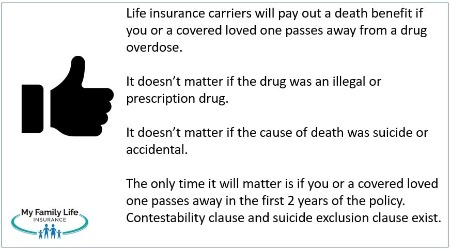Life Insurance Cover Overdose? may cover an overdose, but it depends on the policy and circumstances. Some policies have exclusions for drug-related deaths.
Life insurance provides financial security for loved ones after the policyholder’s death. Overdose cases can be complex, as insurance companies examine the circumstances and policy details.
Policies might have specific clauses regarding drug-related deaths. Understanding these exclusions and terms is crucial for policyholders.
Insurance companies assess the cause of death to determine claim validity. Some policies might deny coverage if the overdose was intentional.
It’s essential to read and understand your life insurance policy thoroughly. Consulting with an insurance agent can provide clarity on coverage specifics. Knowing these details helps make informed decisions about life insurance.
Introduction To Life Insurance And Overdose Concerns
Life insurance provides financial protection for loved ones. It is a safety net. Overdose concerns can complicate this safety net. Understanding the link between life insurance and overdose is crucial. It helps in making informed decisions.
The Role Of Life Insurance
Life insurance offers many benefits. It covers funeral costs. It can pay off debts. It supports your family’s future. Policies are meant to reduce financial stress. They provide peace of mind.
The Impact Of Overdose On Policy Benefits
Overdose can affect life insurance benefits. Insurers may investigate the cause of death. This process determines if the policy will pay out. Each policy has specific terms. They outline conditions under which benefits are paid.
| Scenario | Impact on Policy |
|---|---|
| Accidental Overdose | May still pay out, depending on the policy |
| Intentional Overdose | Less likely to pay out; depends on terms |
Policies may exclude certain risks. This includes drug abuse. Reading your policy carefully is important. Consult with an insurance expert if needed.
- Review your policy terms
- Understand exclusions
- Seek professional advice

Types Of Life Insurance Policies
Understanding life insurance policies is important. Different policies handle overdose cases differently. This section explains the main types of life insurance: Term Life and Whole Life.
Term Life Insurance Explained
Term Life Insurance provides coverage for a specific period. Common terms are 10, 20, or 30 years. If the insured dies during the term, the beneficiary gets the payout.
Term life is usually cheaper than whole life. It does not build cash value. If the policy expires before death, there is no payout.
Table:
| Feature | Term Life Insurance |
|---|---|
| Coverage Period | Fixed term (10, 20, 30 years) |
| Premiums | Usually lower |
| Cash Value | None |
| Payout on Overdose | Depends on policy terms and insurer |
Understanding Whole Life Coverage
Whole Life Insurance provides coverage for the insured’s entire life. It includes a savings component known as cash value.
Premiums are higher than term life. The policy builds cash value over time, which can be borrowed against. Whole life guarantees a payout, as long as premiums are paid.
- Lifetime coverage
- Higher premiums
- Builds cash value
- Guaranteed payout
Overdose coverage depends on the policy and insurer. Some policies have exclusions or waiting periods.
Policy Clauses And Overdose Scenarios
Life insurance policies have specific clauses related to overdose scenarios. Understanding these clauses helps determine if your policy covers overdose.
Accidental Death Benefits
Many life insurance policies include Accidental Death Benefits. These benefits provide extra coverage if the policyholder dies from an accident.
An accidental overdose may qualify under this clause. The insurance company must determine the overdose was unintentional. This means the death was not a result of suicide or intentional harm.
| Accidental Death Benefits | Requirements |
|---|---|
| Additional Payout | Death must be accidental |
| Overdose Coverage | Proof of unintentional overdose |
Suicide Clauses In Life Insurance
Most policies have a Suicide Clause. This clause states that the policy will not pay out if the policyholder commits suicide within a certain period, usually two years.
If the overdose is ruled as suicide, the insurance company may not pay the claim. It is crucial to read your policy’s specific terms and conditions.
Here are some points to remember:
- Check the period of the suicide clause.
- Understand the definition of suicide in your policy.
- Consult with your insurance agent for clarity.
Knowing these clauses helps ensure you have the right coverage. It also helps you understand what scenarios your policy covers.

Examining The Cause Of Overdose
Understanding the cause of an overdose is crucial for life insurance claims. Insurance companies need to know if the overdose was accidental or intentional. This helps determine if the policy will pay out. Let’s explore the different aspects of this investigation.
Accidental Vs. Intentional Overdose
An accidental overdose occurs when a person takes too much of a substance by mistake. This can happen with prescription drugs or recreational substances. Accidental overdoses are often covered by life insurance policies.
An intentional overdose involves the person knowingly taking a lethal dose. This is often linked to suicide. Life insurance policies may not cover intentional overdoses. Insurers usually have specific clauses about this.
Investigating Substance Use History
Insurance companies will look into the person’s substance use history. They check medical records and any history of substance abuse. This helps them determine the likelihood of an accidental overdose.
They may also review the person’s prescriptions. This helps identify if the person was taking the medication as prescribed. Any history of misuse can affect the claim outcome.
Below is a table summarizing key differences:
| Aspect | Accidental Overdose | Intentional Overdose |
|---|---|---|
| Definition | Unintentional excessive intake | Deliberate excessive intake |
| Insurance Coverage | Usually covered | Often not covered |
| Investigation Focus | Medical and prescription history | Mental health and intent |
Understanding these aspects helps clarify how life insurance companies handle overdose cases. It’s essential for policyholders and their families to be informed.
Legal Aspects Of Overdose Claims
Understanding the legal aspects of overdose claims is crucial. Life insurance policies often have specific terms. These terms can impact whether an overdose is covered. Let’s explore key legal factors.
The Role Of Toxicology Reports
Toxicology reports play a vital role in overdose claims. These reports show the substances in the body at death. They help determine if the death was accidental or intentional.
Insurance companies use toxicology reports to evaluate claims. If the report shows illegal drugs, the claim might be denied. If prescription drugs are present, the context matters. Was the medication taken as prescribed? Overuse or misuse can affect the claim.
Disputes And Litigation Over Overdose Deaths
Disputes often arise over overdose death claims. Families may argue the overdose was accidental. Insurance companies may deny claims, citing policy exclusions.
Litigation can follow these disputes. Courts examine the policy terms and toxicology reports. They decide if the claim should be paid. Legal battles can be lengthy and stressful.
Consider these factors in disputes:
- Policy Exclusions: Does the policy exclude drug-related deaths?
- Intent: Was the overdose accidental or intentional?
- Substance Type: Were the drugs illegal or prescribed?
Understanding these aspects can help in navigating legal challenges. Proper legal advice is often necessary.
Insurance Company’s Response To Overdose
Life insurance policies can be complex, especially with overdose cases. The response of an insurance company varies based on several factors. Understanding their decision-making process is crucial.
Claim Denial Reasons
Insurance companies may deny claims for various reasons. Here are some common ones:
- Policy Exclusions: Many policies exclude coverage for illegal drug use.
- Misrepresentation: Providing false information can lead to denial.
- Contestability Period: If the death occurs within the first two years, claims are scrutinized.
The Process Of Claim Review
The claim review process involves several steps. Each step ensures the legitimacy of the claim:
- Initial Notification: The beneficiary notifies the insurer of the death.
- Documentation: The insurer requests the death certificate and medical records.
- Investigation: The insurer investigates the cause of death.
- Decision: Based on findings, the claim is approved or denied.
Understanding these steps helps in navigating the claim process smoothly. Always provide accurate information to avoid complications.
Steps To Secure Coverage For Overdose Risks
Securing life insurance coverage for overdose risks requires careful planning. Insurance companies are thorough in their evaluation. Following the right steps can improve your chances of approval.
Choosing The Right Policy
Selecting the appropriate policy is crucial. It determines the extent of coverage. Here are some key points to consider:
- Term Life Insurance: Offers coverage for a specific period.
- Whole Life Insurance: Provides lifelong coverage and builds cash value.
- Universal Life Insurance: Flexible premiums and death benefits.
Compare different policies to find the best fit. Make sure the policy covers overdose risks. Read the fine print for any exclusions or limitations.
Disclosure Of Medical History And Lifestyle
Full disclosure of your medical history is vital. Insurance companies need accurate information. This includes:
- Past Health Conditions: Any previous illnesses or treatments.
- Current Medications: List all medicines you’re taking.
- Lifestyle Habits: Mention smoking, alcohol use, or drug habits.
Being honest about your lifestyle is essential. Misrepresentation can lead to policy denial. Underwriters assess the risk based on this information.
| Information Required | Details |
|---|---|
| Medical History | Past illnesses, treatments, and surgeries |
| Current Medications | All prescribed and over-the-counter drugs |
| Lifestyle Habits | Smoking, alcohol consumption, drug use |
Prepare all necessary documents. This ensures a smooth application process. Remember, transparency is key to securing coverage.
Real-life Cases And Precedents
Real-life cases and precedents can help understand whether life insurance covers overdose. Different court rulings and their impacts shape insurance policies.
Notable Court Rulings
There have been several significant court rulings on life insurance and overdose cases. Some have favored the beneficiaries, while others have not.
| Case | Ruling | Year |
|---|---|---|
| Smith vs. Insurance Co. | Beneficiary won | 2015 |
| Doe vs. Life Insurers | Insurance won | 2018 |
In Smith vs. Insurance Co., the court ruled in favor of the beneficiary. The court found that the overdose was accidental.
In contrast, the ruling in Doe vs. Life Insurers favored the insurance company. The court determined that the overdose was intentional, voiding the policy.
Impact On Future Policyholders
Court rulings have a significant impact on future policyholders. They can set precedents that influence how insurance companies write policies.
- Accidental overdoses may be covered.
- Intentional overdoses are typically not covered.
- Definitions of “accidental” and “intentional” vary by case.
Policyholders should read their policies carefully. Understanding the terms can help avoid disputes.
Insurance companies also adjust their terms based on court rulings. This helps them manage risk and maintain fairness.
Navigating The Claims Process
Understanding how to navigate the life insurance claims process after an overdose can be challenging. This section will guide you through the steps you need to take.
Filing A Claim After An Overdose
Filing a claim after an overdose requires careful attention to detail. Insurance companies need specific documents and evidence.
- Obtain the official death certificate.
- Gather medical records detailing the cause of death.
- Submit the policyholder’s life insurance policy documents.
Contact the insurance company to start the claims process. They will provide necessary forms. Fill out these forms with accurate information. Any discrepancies can delay the process.
Insurance companies may investigate the circumstances of the overdose. Be prepared to provide additional information if requested. Cooperation with the insurance company is crucial.
Seeking Legal Assistance
Sometimes, claims can get complicated. Seeking legal assistance can help you navigate these complexities.
Legal experts can offer valuable guidance. They understand insurance laws and policies well. They can help you gather and present required documents correctly.
Lawyers can also represent you if disputes arise. They ensure your rights are protected throughout the claims process.
Consider hiring a lawyer experienced in life insurance claims. They can make the process smoother and less stressful.
| Steps | Description |
|---|---|
| 1. Document Collection | Gather death certificate, medical records, and policy documents. |
| 2. Contact Insurance Company | Inform them of the claim and get necessary forms. |
| 3. Fill Out Forms | Complete forms with accurate information. |
| 4. Submit Documents | Provide all required documents to the insurance company. |
| 5. Legal Assistance | Seek help from legal experts if needed. |
Conclusion: Protecting Loved Ones
Life insurance is a safety net for your family. It provides financial security during tough times. One critical aspect to understand is whether it covers an overdose.
Understanding Policy Limitations
Each life insurance policy has specific limitations. Some policies may exclude deaths due to overdose. This exclusion can vary by insurer and policy type. Reviewing your policy carefully is crucial.
| Policy Type | Overdose Coverage |
|---|---|
| Term Life Insurance | May Exclude Overdose |
| Whole Life Insurance | Depends on Circumstances |
The Importance Of Honest Disclosure
Honesty is vital when applying for life insurance. Always disclose medical history and substance use. Insurers need accurate information to assess risk properly.
If dishonesty is discovered, the policy may be void. This means no payout for your loved ones. Honesty ensures your family gets the benefits they need.
Protecting your loved ones starts with understanding your policy. Ensure you disclose all necessary information to your insurer. This way, your family is taken care of, even in the worst circumstances.

Will life insurance cover overdose in florida
In Florida, life insurance policies generally cover deaths resulting from an overdose, but specific circumstances and policy terms can affect the payout. Most life insurance policies have a contestability period, usually the first two years,
during which the insurer can investigate the cause of death and deny the claim if they find any misrepresentation or fraud in the application. If the overdose occurs after this period and there was no fraudulent information provided,
the death benefit is typically paid out. However, if the overdose is determined to be a suicide within the contestability period, most policies have a suicide clause that may prevent the payout. Additionally,
if the insured person had a history of substance abuse that was not disclosed at the time of application, the insurer might deny the claim based on misrepresentation. It’s crucial for policyholders to be honest about their medical and lifestyle history when applying for life insurance to ensure their beneficiaries receive the intended benefits.
Will life insurance pay if cause of death is undetermined
Life insurance policies generally cover deaths where the cause of death is undetermined, but the claim process can be more complex and prolonged. When the cause of death is listed as undetermined,
the insurance company may conduct a thorough investigation to rule out any exclusions, such as suicide within the contestability period, misrepresentation, or illegal activities.
This investigation ensures that there are no policy violations that would void the claim. If the investigation finds no evidence of excluded causes, the insurer typically pays the death benefit. However, the process may take longer than usual due to the additional scrutiny.
Beneficiaries should provide all requested documentation and cooperate fully with the insurer to expedite the claim process. Consulting with a legal or insurance advisor can also help navigate any complications that arise during such investigations.
Frequently Asked Questions
Does Life Insurance Pay For An Overdose?
Life insurance may pay for an overdose, depending on policy terms and circumstances. Consult your policy and insurer for details.
Is An Overdose Considered Accidental Death?
Yes, an overdose can be classified as an accidental death. It depends on the specific circumstances and intent.
What Type Of Death Is Not Covered In Term Insurance?
Term insurance does not cover death due to suicide within the first year, illegal activities, or risky hobbies like skydiving.
Can You Get Life Insurance For Someone Who Does Drugs?
Yes, you can get life insurance for someone who does drugs. Premiums will be higher, and coverage options may vary.
Conclusion
Understanding life insurance policies is crucial for everyone. Overdose coverage varies by policy and insurer. Always read policy details carefully. Consult with an insurance expert to ensure your needs are met. Being informed helps you make better decisions for your future and loved ones.
Stay proactive and protect your family.

Hello and welcome to HealthcareInsuranceNews.com! I’m Emon Sheikh, and I’m thrilled to be your guide through the intricate world of healthcare insurance.
As a dedicated blog writer focusing on healthcare insurance, I’m passionate about helping individuals navigate the complexities of insurance policies, understand their coverage options, and make informed decisions to protect their health and finances.
With a background in Life Insurance, Travel Insurance, Medical Insurance, Pet Insurance, Students Insurance, Cancer Insurance, I bring a wealth of knowledge and insights to my writing. Through my blog posts, I aim to demystify insurance jargon, provide practical tips, and keep you up-to-date on the latest developments in the healthcare insurance landscape.
Whether you’re a seasoned insurance professional, a healthcare provider, or someone simply seeking guidance on finding the right insurance plan, I’m here to provide valuable information and support. Together, let’s unravel the complexities of healthcare insurance and empower you to take control of your healthcare journey.
Thank you for visiting HealthcareInsuranceNews.com, and I look forward to sharing this journey with you!
Best regards,
Emon Sheikh
